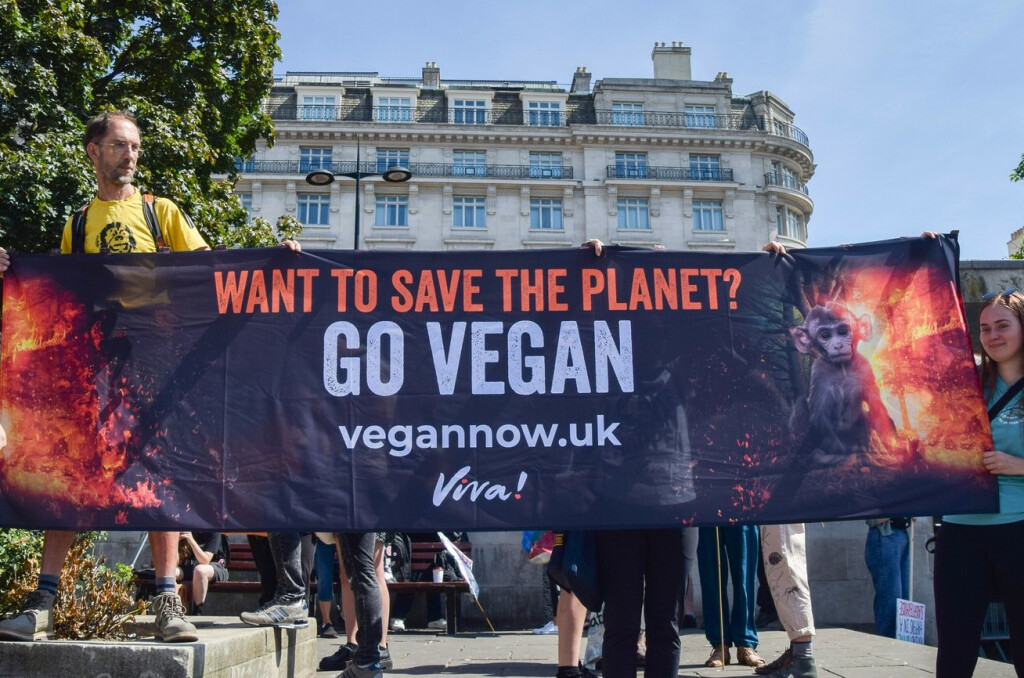Background: food systems in climate change

Agriculture and our diet contribute to about one-third of global emissions. The theme day, "Food, Agriculture and Water" at COP28, focuses on the food system in climate negotiations. What key points are being discussed?
Here's what it's about:
For the first time at a UN climate conference, food and food systems play a crucial role in Dubai. There is, for example, a Food Pavilion, and the theme day on "Food, Agriculture and Water" also puts the topic on the agenda of COP28. The discussions on this topic are approached from two perspectives. Firstly, addressing hunger and ensuring food security in times of climate change. Secondly, discussions revolve around how to reduce the consumption of meat and dairy products since they cause significantly more emissions per kilogram and calorie compared to plant-based foods. This year, COP mainly offers vegan catering.
Why this is important:
Food systems contribute to one-third of global greenhouse gas emissions. Approximately two-thirds of these emissions come from the production of animal products, even though they constitute only 19 percent of the calories and 41 percent of the protein of all globally produced foods. One of the key issues is land-use changes and deforestation. Industrial agriculture also contributes to biodiversity loss.
So far, dietary change as a driver of climate change has played a subordinate role in political measures: While more than 100 countries have included agriculture in their Nationally Determined Contributions (NDCs), only five NDCs address consumption. These five countries are developing nations with relatively low greenhouse gas emissions from food. At the same time, climate change has significant impacts on food production: droughts and other factors increasingly bring about food insecurity. Due to the war in Ukraine, the issue of food insecurity has gained prominence in international discussions and is now a top priority for many countries, far ahead of the transition of food systems.
Here are the details:
The UAE called on countries to sign a declaration on Sustainable Agriculture, Resilient Food Systems, and Climate Action.
In the declaration, states are urged to integrate food and agriculture systems into various climate action measures, namely:
their National Determined Contributions (NDCs),
National Adaptation Plans (NAPs),
and National Biodiversity Strategies and Action Plans (NBSAPs).
The declaration is not an official negotiating document of the COP. However, there is also a negotiation process on food and climate: the Sharm el-Sheikh Joint Work on Implementation of Climate Action on Agriculture and Food Security (SSJW). The SSJW is the official mechanism that brings food and agriculture into the UNFCCC. The SSJW process is to last four years, was launched at COP27 and is the continuation of the previous Koronivia Joint Work on Agriculture.
The name alone indicates that there is now more awareness of the complexity of food and climate action issues. The work program acknowledges the priority of ensuring food security and ending hunger but also recognizes the particular vulnerability of food production systems to the impacts of climate change. It also emphasizes the role of farmers, including smallholders and herders, as key actors in change and acknowledges that solutions are context-specific and must take national circumstances into account.
As a result of COP28, a three-year work plan for the SSJW will be developed.
Criticism:
At the end of October, around 85 NGOs such as WWF, The Food Systems Partnership, and the Food and Land Use Coalition called for recognizing the relevance of food systems to climate and the Paris Agreement. They particularly criticize the lack of a holistic approach to nutrition in the SSJW.
The work program should also include the following key elements:
"nature-positive" food production,
healthy and sustainable nutrition,
proposing solutions for food waste and waste since around 17 percent of food is wasted.
NGOs also demand that food systems receive widespread attention in national climate protection policies and long-term planning before COP30.
Regularly, it is also criticized that consumption issues in the context of nutrition are not adequately addressed, and there are too few measures that actually change behavior and eating patterns.
This could be an outcome of COP28:
A concrete output and success already lie in the declaration on agriculture and nutrition. 134 countries have signed it, covering 75 percent of emissions from food production. Environmental organizations welcomed the declaration, stating that it could bring additional funds for sustainable food systems. Additionally, it can help make solutions for sustainable and climate-friendly nutrition visible.
At the same time, the SSJW work program is being pushed forward and discussed. However, significant progress in this regard is unlikely as results from this process are expected only in 2026 at COP31.
Letzte Aktualisierung: 24. Juli 2025

